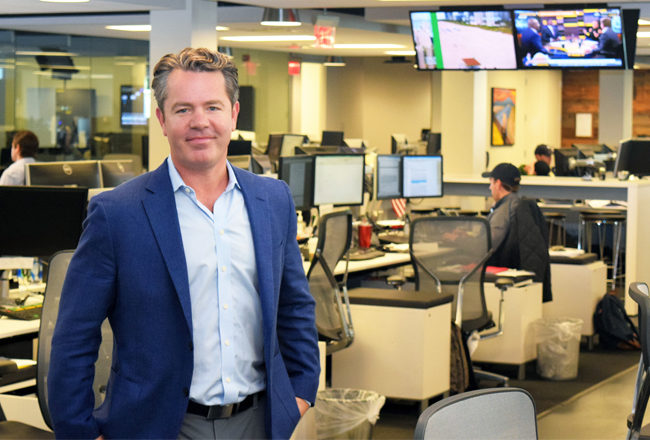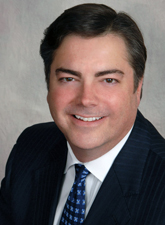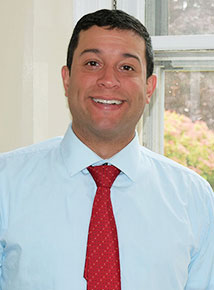With the stock market bouncing and the words “recession” and “depression” being tossed about like New Year”™s confetti, it is easy to become confused and anxious over one”™s investment portfolio. Financial experts queried by the Business Journal offered their advice on how to react to the tumult of the COVID-19 crisis.
KEEP POLITICS OUT OF IT

One aspect that should not be part of an investment strategy is a political agenda. According to Keith McCullough, CEO of Stamford-based Hedgeye Risk Management, more than a few people offering investment advice are “politically compromised” and are offering scenarios based on political hopes rather than financial realities. Speaking on a recent broadcast of Hedgeye”™s online program “The Macro Show,” he cited unnamed figures who predicted a stock market that will stop plummeting and an economy reopening sooner than later.
“A lot of people need that to happen,” McCullough said. “I get it. But that doesn”™t mean it”™s going to happen.
“The big problem that you really need to think about is who”™s telling me this, as opposed to tell me what is happening with the data and what”™s most likely to happen next. You”™re watching the crowd react viscerally and emotionally to every single tick with absolutely no process and no experience.”
The political influence on investment talk has happened on live television, according to Paul Sorbera, president of New York City-based Alliance Consulting. Sorbera, who is working from his Greenwich residence due to the coronavirus pandemic, recalled a recent episode on Jim Cramer”™s CNBC show after the host interviewed Treasury Secretary Steven Mnuchin regarding the federal government”™s planned assistance for the airline industry.
“They didn”™t use the word ”˜bailout,”™ ” said Sorbera. “But as soon as Mnuchin was gone, Jim Cramer said, ”˜the bailout of the airline industry”™ ”“ and then, next thing you know, he”™s looking at his phone. And Cramer says, ”˜Oh, Mr. Mnuchin just called me and he”™s telling me it”™s not a bailout of the airline industry. I apologize. I”™m using the wrong terminology.”™”
NOT A KISS OF DEATH
Jeffrey Corliss, managing director for RDM Financial Group at Hightower in Westport, has

been receiving numerous calls from his clients on whether they should bail out of the markets. Corliss has been repeatedly trying to assure clients that bull markets don”™t last forever, but bear markets are not a kiss of death.
“The worst thing that people can do is say, ”˜I can”™t take it anymore. Get me out and go to cash,”™ ” he said. “If we own good, solid things and the planning is something that we have done, this is going to be a temporary situation. I don”™t know what the temporary timeframe is, but eventually we”™ll recover as long as we own good, solid companies.”
Corliss admitted that many people seem to have forgotten the chaos created a dozen years ago with the Great Recession, adding that people have “become accustomed to things going well, until they don”™t.” He added the 24/7 news coverage of the pandemic has made people anxious, but he also stressed that the strategies designed for clients were meant for bad times as well as good times.
“I tell clients, ”˜Do you remember when we did your planning? We assumed 3 or 4 or 5% rate of return,”™ ” he continued. “And I say, ”˜Right now, we”™re giving back a lot of what we had gained from last year. But if we stick to the plan, then over time that allocation that we have should get you where you need to be ”“ and it”™s really trying to just hold your nose and tune out the news media.”™ I”™m not going to bet against the American economy.”
Corliss acknowledged that his work now has a greater emotional element in alleviating client concerns.
“Our biggest value is really the behavioral therapy that we go through, especially during these times,” he said. “That”™s why we need to be the calming influence and put out pieces that we email to people about how what”™s going on, saying it”™s going to be OK and trying to assuage people”™s fears. Because everybody will be talking to all their friends and everybody”™s freaked out.”
A SECOND LOOK
Scott Acheychek, president of REX Shares LLC in Fairfield, said this could be a good time to take a second look at one”™s investments.

“In my own 401(k), I saw my balances definitely come down quite a bit,” he said. “But I will use it as an opportunity to get out of some names that are just stale in my portfolio ”“ whether that”™s mutual funds or ETFs (exchange-traded funds) I bought a couple years ago that I don”™t necessarily believe in right now, or I haven”™t necessarily been following actively.”
One company has captivated him.
“Zoom has been taking off quite a bit lately,” he continued, referring to the NASDAQ-traded teleconferencing company whose platform is being used for many of today”™s virtual conferences. “I feel like I”™m getting an invite to different kinds of Zoom events all the time.”
Acheychek also offered a positive word for the cryptocurrency Bitcoin, which he predicted could gain new favor.
“I find Bitcoin pretty interesting just to have some form of global currency,” he said. “Countries around the world are printing more and more money and they”™re potentially devaluing their own currencies. In those situations, historically things like gold have performed pretty well, and it”™s going to be interesting to see how Bitcoin responds here.”
SURVIVAL IN THE MARKET

Nicholas Coriano, partner at Cervitude Inc. in Bridgeport, warned that some businesses will not survive the tumult.
“There”™s a good chance that the businesses that were not already solvent will either go out of business or get bought up by a competitor,” Coriano said. “You should be diligent about investing right now and making sure that you”™re picking companies that already had good management, good financials and that could have weathered the storm regardless of what was happening.
“We have a ton of unemployment, a ton of jobless claims and there”™s real suffering.”





















